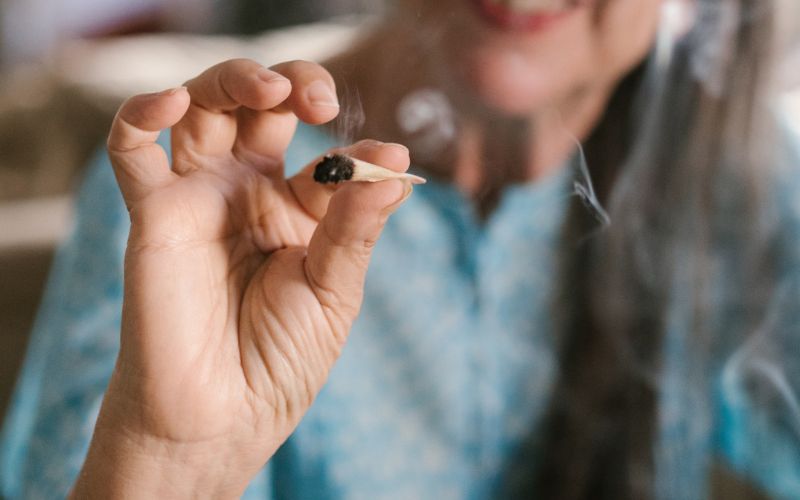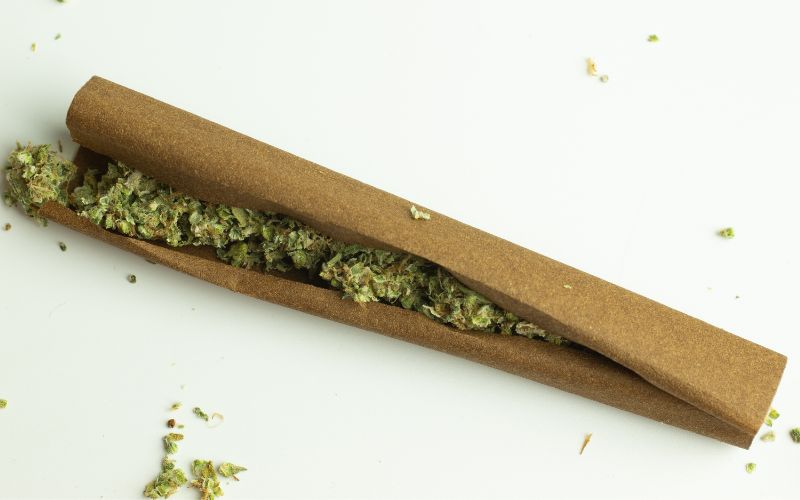What is Delta-8 THC and How is it Different From Delta-9 THC?

Delta-8 THC (Δ8-THC) is a naturally occurring cannabinoid found in cannabis plants. It is structurally similar to the more commonly known delta-9 THC (Δ9-THC), which is the main psychotropic component in cannabis responsible for the “high” feeling.
The main difference between delta-8 THC and delta-9 THC is their chemical structure. Delta-8 THC has a double bond on the eighth carbon atom in its molecular structure, while delta-9 THC has a double bond on the ninth carbon atom. This subtle difference in chemical structure can result in some differences in how the two compounds interact with the body.
One key difference is the potency of the compounds. Delta-8 THC is typically considered to be less potent than delta-9 THC, meaning that it may produce a milder “high” or altered state of consciousness. Additionally, some users report that delta-8 THC produces less anxiety and paranoia than delta-9 THC, making it a potentially useful option for those who are sensitive to these effects.
Another important difference is the legal status of the two compounds. While delta-9 THC is considered a Schedule I controlled substance at the federal level in the United States, delta-8 THC is considered a legal gray area. Some states have explicitly banned delta-8 THC, while others have not yet addressed its legality.
Overall, while delta-8 THC and delta-9 THC are similar in some ways, their differences in chemical structure and potency can result in different effects on the body and different legal status.
Why is Delta-8 THC Gaining Popularity?
Delta-8 THC is gaining popularity for a few different reasons. One reason is that it is seen as a milder alternative to delta-9 THC, which is the primary psychoactive compound in cannabis responsible for the “high” feeling. Some people who are sensitive to the anxiety-inducing effects of delta-9 THC may find that delta-8 THC produces less anxiety and paranoia.
Another reason for its popularity is that it is considered a legal gray area in some places. While delta-9 THC is still illegal at the federal level in the United States, delta-8 THC is not explicitly listed as a controlled substance in the 2018 Farm Bill, which declared hemp legal and legalized hemp-derived products. Some manufacturers have seized upon this loophole to produce delta-8 THC products that can be sold legally in some states.
Additionally, the rise of the CBD industry has led to an interest in other cannabinoids found in hemp and cannabis plants. Delta-8 THC is one such cannabinoid that is gaining attention from consumers who are looking for alternative ways to experience the benefits of cannabis without the psychoactive effects of delta-9 THC.
Finally, some people simply enjoy the effects of delta-8 THC and find that it provides a different kind of experience than delta-9 THC. As with any cannabis product, individual experiences can vary, and what works well for one person may not work as well for another.
What Kind of Drug Tests can Detect Delta-8 THC?
Standard drug tests, such as urine or saliva tests, are generally not designed to detect delta-8 THC specifically. These drug tests are typically designed to detect the presence of delta-9 THC, the psychoactive component responsible for the “high” associated with cannabis use. However, these tests are typically designed to detect THC metabolites in general, which can include both delta-8 THC and delta-9 THC.
The specific type of drug test used can also affect whether delta-8 THC is detected. For example, hair follicle tests may be more sensitive than urine tests and could potentially reveal traces of delta-8 THC for a longer period of time.
It is important to note that the legality of delta-8 THC is still a legal gray area in some places, and while it may be legal to possess and use delta-8 THC in certain states, it is still a controlled substance in others. Employers and other organizations may still have policies in place that prohibit the use of all forms of THC, including delta-8 THC, and may conduct drug tests that can detect its presence. Therefore, anyone who is subject to drug testing should exercise caution when using delta-8 THC products.
Understanding the Possibility of Testing Positive for Delta-8 THC

There is a possibility that using delta-8 THC products can cause a positive drug test for THC, especially in chronic users. The likelihood of testing positive for THC after using delta-8 THC products will depend on several factors, including the sensitivity of the drug test being used, the frequency and amount of delta-8 THC use, and individual differences in metabolism and elimination of the compound.
Most drug tests are typically designed to detect THC metabolites, which can include both delta-8 THC and delta-9 THC. However, the specific cutoff levels used in the test can vary, and some tests may be more or less sensitive than others. In general, the higher the dose and frequency of delta-8 THC use, the longer it is likely to stay in the human body and potentially be detected on a drug test. Essentially, if you are a frequent user of delta-8, you are typically more likely to test positive on a drug test than occasional users.
It is important to note that the legality of delta-8 THC is still a legal gray area in some places, and while it may be legal to possess and use delta-8 THC in certain states, it is still a controlled substance in others. Employers and other organizations may still have policies in place that prohibit the use of all forms of THC, including delta-8 THC, and may conduct drug tests that can detect its presence.
If you are subject to drug testing and have used delta-8 THC products, it is important to be aware of the policies of your employer or organization and to use delta-8 THC products with caution. If you are concerned about testing positive for THC, it may be best to avoid using any form of THC, including delta-8 THC.
How Long Does Delta-8 Stay in Your System?

The length of time that Delta-8 THC stays in your system depends on several factors, including the amount and frequency of use, individual differences in metabolism, and the sensitivity of the drug test being used.
Urine Test
A urine drug test is a common type of drug test that is used to detect the presence of drugs or their metabolites in a person’s urine sample. It is a non-invasive and relatively inexpensive way to test for drug use, and is often used by employers, schools, and other organizations to screen for drug use. During a urine drug test, a person is asked to provide a urine sample, which is then sent to a laboratory for analysis. The sample is typically analyzed for the presence of specific drugs or drug metabolites, depending on the type of test being used. There are different types of urine drug tests available, including screening tests and confirmatory tests. Screening tests are typically used first to detect the presence of drugs or drug metabolites in the urine. If a positive result is obtained, a confirmatory test may be performed to confirm the result. While there is limited research on the detection window of delta-8 THC specifically, it is believed to have a similar elimination pattern to delta-9 THC, which is the main psychoactive component of cannabis. According to some studies, delta-9 THC can remain detectable in urine tests for up to 30 days after heavy use, although it is often eliminated more quickly. Based on this information, it is possible that delta-8 THC could be detected in a urine test for up to several days after use, although this can vary depending on individual differences and the sensitivity of the drug test being used. In general, it is believed that THC metabolites can stay in your system for up to 30 days, so it’s best to stop using delta-8 at least a month before any drug test if you are concerned about testing positive for THC.Hair Follicle Test
A hair follicle drug test is a type of drug test that uses a sample of hair to detect the presence of drugs or their metabolites in a person’s system. Hair follicle drug tests are often used to detect drug use over a longer period of time than other types of drug tests, such as urine or saliva tests. When a person uses cannabis, THC and its metabolites are absorbed into the bloodstream and eventually deposited in the hair follicle as the hair grows. Hair samples are collected from the scalp, and the section of hair closest to the scalp is typically tested. The sample is then sent to a laboratory for analysis. The laboratory will typically analyze the sample for the presence of specific drugs or drug metabolites, in this case testing for THC metabolites. Delta-8 THC is believed to have a similar elimination pattern to delta-9 THC, which is the main psychoactive component of cannabis. According to some studies, delta-9 THC can be detected in a hair test for up to 90 days or even longer, after use. Based on this information, it is possible that delta-8 THC could also be detectable in hair tests for up to 90 days or longer after use. However, it is important to note that individual factors such as hair growth rate, hair type, and drug use patterns can also affect the detection window.Blood Test
A blood drug test is a type of drug test that uses a sample of blood to detect the presence of drugs or their metabolites in a person’s system. Blood tests are often used to detect recent drug use or to monitor drug levels in people who are taking prescription medications. During a blood test, a healthcare provider will use a needle to draw a sample of blood from the person’s arm. The blood sample is then sent to a laboratory for analysis. The laboratory will typically analyze the sample for the presence of specific drugs or drug metabolites, depending on the type of test being used. Delta-8 THC is believed to have a similar elimination pattern to delta-9 THC, which can be detected in blood tests for up to 2-7 days after use, although it is often eliminated more quickly. Based on this information, it is possible that delta-8 THC could be detected in the blood for up to several days after use, although this can vary depending on individual differences and the sensitivity of the drug test being used.Saliva Test
A saliva drug test, also known as an oral fluid test, is a type of drug test that uses a sample of saliva to detect the presence of drugs or their metabolites in a person’s system. Saliva drug tests are often used to detect recent drug use or to monitor drug levels in people who are taking prescription medications. During a saliva test, a healthcare provider will collect a sample of the person’s saliva using a swab or other collection device. The sample is then analyzed for the presence of specific drugs or drug metabolites, such as THC. Delta-8 THC is believed to have a similar elimination pattern to delta-9 THC, the main psychoactive component of cannabis. According to some studies, delta-9 THC can be detected in saliva for up to 24-72 hours after use, although it is often eliminated more quickly. Based on this information, it is possible that delta-8 THC could be detected in saliva for up to several days after use, although this can vary depending on individual differences and the sensitivity of the drug test being used. If you are subject to drug testing, it is important to be aware of the policies of your employer or organization and to use delta-8 THC products with caution. If you are concerned about testing positive for THC, it may be best to avoid using any form of THC, including delta-8.Tips to Prevent a Positive Result on a Drug Test

If you are using delta-8 and are concerned about passing a drug test, there are a few things you can do to reduce the risk of a positive result:
Stop using Delta-8: The most effective way to avoid a positive drug test is to stop using delta-8. THC metabolites can stay in your system for up to 30 days, so it’s best to stop using delta-8 at least a month before a drug test.
Drink plenty of water: Drinking lots of water can help flush THC metabolites out of your system more quickly. However, be careful not to drink too much water as this can lead to water intoxication, which can be dangerous.
Exercise regularly: Exercise can help burn fat cells where THC metabolites are stored. However, be aware that exercising too much right before a drug test can also increase THC levels in your urine.
Use a detox product: There are many detox products on the market that claim to help you pass a drug test. Some of the most popular detox products come in the form of a detox drink, detox pills, or mouthwash. However, be aware that these products are not guaranteed to work, and some may even be harmful to your overall health.
Be honest with your employer: If you are concerned about failing an impending drug test, it may be best to be honest with your employer or whoever is ordering the drug test. They may be more understanding if you are upfront about your cannabis use and can work with you to find a solution.
In conclusion, while delta-8 may have some potential benefits, it is important to be aware of the potential risks associated with using it, including the possibility of failing a drug test. THC metabolites can stay in the body for up to 30 days, so it is essential to be cautious when using delta-8, especially if you are subject to drug testing.
The best way to avoid a positive drug test is to stop using delta-8 altogether or to be honest with your employer about your drug use. As with any substance, it is crucial to use delta-8 responsibly and to make informed decisions about its use. As with any cannabis product, it’s recommended to consult with a healthcare professional before incorporating delta-8 into your wellness routine, especially if you are concerned about passing an upcoming drug test.



